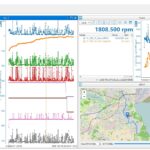Connecting your smartphone or tablet to your car’s onboard diagnostics (OBD) system opens up a world of information about your vehicle’s performance and health. To do this, you’ll need an Obd2 Scanner Adapter. But with so many options available, how do you choose the right one? This guide will walk you through the different types of OBD2 scanner adapters, compatibility issues, and help you identify quality adapters to avoid common pitfalls.
Understanding OBD2 Scanner Adapter Types
OBD2 scanner adapters act as the bridge between your smart device and your car’s computer. Choosing the correct adapter is crucial for a stable connection and accurate data retrieval. Adapters can be categorized by their connection type:
-
WiFi: These adapters connect to your device wirelessly through a WiFi network created by the adapter itself. While offering flexibility, they can sometimes be less reliable than other options due to potential connection drops or interference.
-
Bluetooth (Classic): Using Bluetooth versions 1.x, 2.x, and 3.x, these adapters offer a faster and more stable connection than WiFi for most Android devices. However, they might experience compatibility issues with some car multimedia systems if your device is already connected via Bluetooth.
-
Bluetooth Low Energy (BLE): Found in Bluetooth version 4.0 and above, BLE adapters prioritize low power consumption. They provide a seamless connection experience for iOS devices and are generally easier to set up than their classic Bluetooth counterparts. However, data transfer speeds might be slightly slower compared to classic Bluetooth.
-
Bluetooth MFi: These adapters use classic Bluetooth but are certified by Apple (Made for iPhone/iPad). This ensures compatibility with iOS devices. While offering excellent performance, they are typically more expensive due to Apple’s licensing fees. OBDLink MX+ and vLinker FS are two examples of MFi certified adapters. They function like regular Bluetooth adapters on Android.
-
USB: Currently not supported by most OBD2 software applications.
Choosing the Right Connection Type for Your Device:
-
iOS (iPhone/iPad): Opt for Bluetooth LE (4.0) adapters for ease of use and a reliable connection. For top-tier performance, consider investing in a Bluetooth MFi certified adapter. Avoid classic Bluetooth adapters as they are not compatible with iOS. Wi-Fi adapters are possible but often lead to connectivity issues.
-
Android: Classic Bluetooth adapters are generally recommended for Android due to their speed and reliability. Bluetooth LE (4.0) is a viable alternative, especially if battery life is a major concern. Wi-Fi adapters should be your last resort due to potential instability.
Identifying a Quality OBD2 Scanner Adapter: Beyond Version Numbers
While adapter version numbers might seem important, they are often misleading and don’t guarantee quality. Focus on finding a “good” adapter that functions as intended, without glitches or freezes. “Bad” adapters, unfortunately prevalent in the market, can cause a range of problems:
- Unreliable Performance: This includes freezing, spontaneous reboots, sensitivity to temperature changes, and intermittent connectivity issues.
- Incomplete Command Support: Some adapters might not support all the necessary commands to access all your vehicle’s data.
- Limited ECU Compatibility: Certain adapters may only work with a specific Electronic Control Unit (ECU) address, limiting diagnostics to only certain systems in your car.
- Data Loss and Corruption: Bad adapters can lose or distort data during transmission, leading to inaccurate readings or even potentially harmful commands being sent to your car’s computer.
Recommended OBD2 Scanner Adapters
Based on user experience and reviews, here are some recommended OBD2 scanner adapters (ranging from high-end to more budget-friendly):
- OBDLink MX+ (Bluetooth MFi): A premium option compatible with both iOS and Android, offering top performance.
- OBDLink CX (Bluetooth LE): Excellent performance with a large memory buffer, suitable for iOS and Android.
- vLinker Series (Various Models): Offers a range of options including Bluetooth LE (MC, MC+) and Bluetooth MFi (FS, MS) models. Ensure firmware is updated for optimal performance.
- Vgate iCar Pro 2S: The newer replacement for the iCar Pro BLE, compatible with all operating systems.
OBD2 Adapters to Avoid
Steer clear of these adapters:
- xTool Adapters: Not ELM327 compatible and only work with their own software.
- Wired Adapters (USB, COM): Not commonly supported by mobile OBD2 software.
- Adapters with “Mini” in the Name: Often low-quality.
- Cheap, Unbranded Adapters: Typically unreliable and prone to issues.
- Specific Brands/MAC Addresses: Avoid adapters with Bluetooth MAC addresses starting with 11:22:33 or 00:00:00, and brands like KONNWEI, “Micro Mechanic,” “THINMI.COM,” and “KUULAA,” due to reported quality control problems.
- Specific Designs: Avoid adapters with certain physical designs known for poor performance (refer to images in the original article).
Conclusion
Choosing the right OBD2 scanner adapter is essential for accessing your vehicle’s diagnostic information. By understanding the different connection types, focusing on quality over version numbers, and considering recommended options, you can make an informed decision and avoid the frustration of a poorly performing adapter. Remember to always check compatibility with your specific device and software before purchasing.

